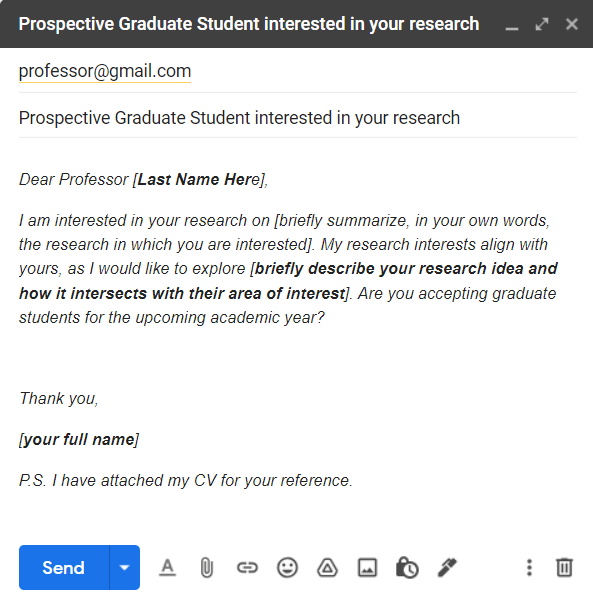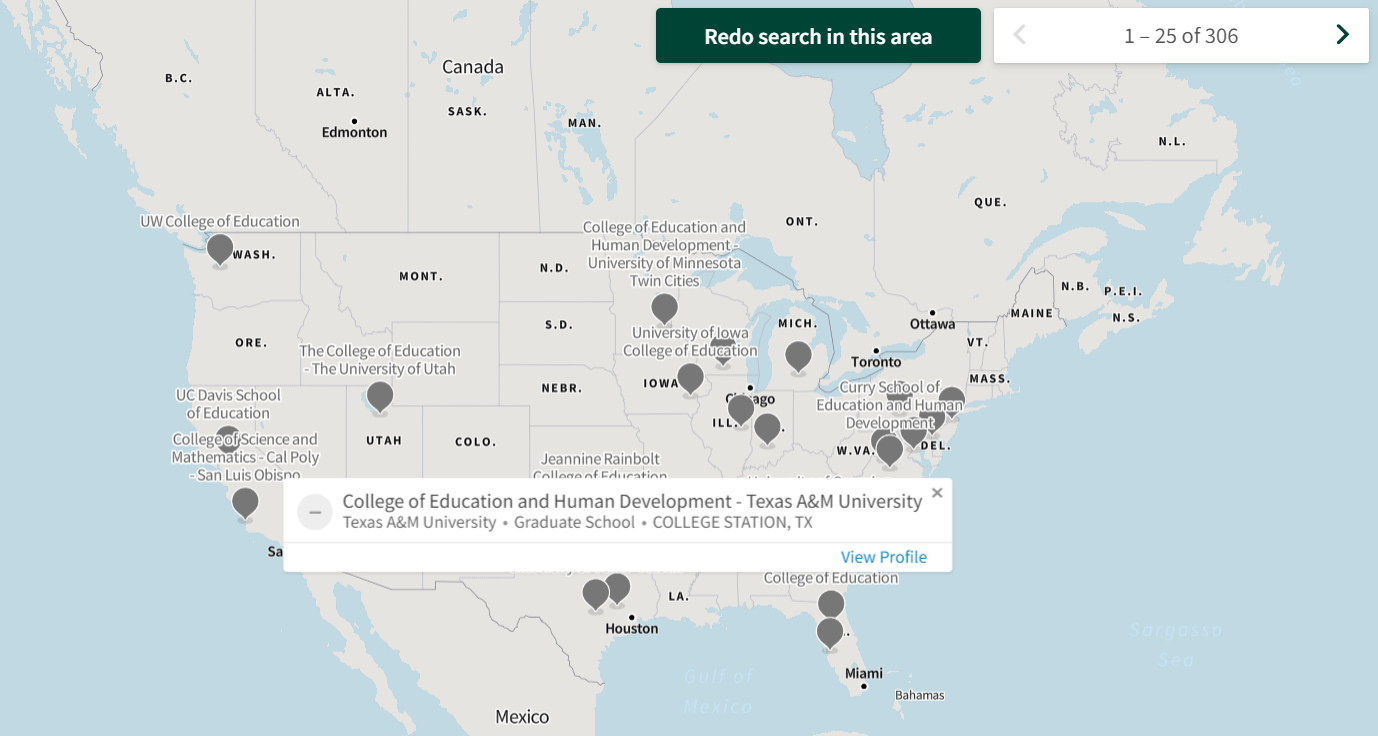
The graduate school application process can be complicated. From deciding whether to go to grad school, to figuring out where to apply and how to prepare a competitive application—it’s a lot to sort out. This handy guide will help you figure it out. From the beginning stages all the way to getting accepted, follow these steps to getting a master’s degree.
- What Is a Graduate Degree?
- Early Preparations for Graduate Degree Application
- Do I Need a Graduate Degree?
- Does Graduate School Suit Everyone?
- How Many Years Is a Graduate Degree?
- What Is an Undergraduate Degree vs. Graduate?
- How to Apply for Graduate Degree?
- How to Apply for a Master’s Degree
- Steps to Get a Master’s Degree
- How Do I Prepare for an Interview for a Graduate Program?
- How to Decide on a Graduate School?
- What Happens If You Don’t Get In?
What Is a Graduate Degree?
Please note that there are several types of advanced education that are not typically referred to as “graduate school.” Graduate programs in law or business are often referred to as “professional programs.” These programs confer different degrees (e.g. JD or MBA) and have different admissions requirements than graduate schools. Likewise, medical schools award different degrees (e.g. MD or DO) and have different admissions and very different program structures.
What Is a Graduate Certificate vs. Degree?
This guide has helpful advice for anyone thinking about getting a graduate degree, but it is most relevant to those considering graduate school to obtain a Master’s degree or Ph.D. For more specific information about the other options I mentioned, seethis guide for applying to business school, this one for law school, or this one for medical school. In addition, most of the advice provided here is helpful for applying to any graduate program. However, most of the information in this article pertains to schools in the United States—specifics such as dates and funding arrangements may differ outside of the US. For details on how to apply to European graduate schools as an American, see this handy article; for Australian schools, the information here should be helpful. Lastly, it is important to note, that while many graduate programs operate similarly, each may have its own deadlines and unique application process. Be certain to research the requirements of each school you are interested in applying to.
If you are considering getting a master’s degree, you might feel overwhelmed by all of the decisions you need to make. Don’t fret – it’s not so intimidating when you break it down into manageable steps. If you have started thinking about graduate school early on, you are ahead of the game. The next section will steer you toward becoming a competitive graduate school candidate.

Early Preparations for Graduate Degree Application
So, you know the answer to the question “What is your motivation for pursuing a graduate degree?” and now, you’re considering graduate school as an option. Here are some things you can do early on to prepare yourself.
Build Positive Relationships
First of all, starting as early in your college career as possible, strive to build positive relationships with your professors. You can do this by being well-prepared for class—do the reading, ask relevant questions, and attend class regularly. Visit office hours to ask any questions you didn’t have the opportunity to ask in class. In addition to helping you establish a relationship with your professor, these tactics will help you earn good grades. You will need a strong GPA to qualify for most graduate programs.
Be Involved
Second, get involved in your department. If you are a biology major, join the biology club. If you qualify, join the biology honors society, Beta Beta Beta. Take advantage of opportunities to attend guest lectures and departmental events. These activities will help you learn more about your field, and they will help the professors in your department know you better. They will also see that you are taking your education seriously.
Gain Valuable Experience
Finally, get a job working in the field you are considering pursuing in graduate school. If you plan to attend graduate school for ecology, see if there are opportunities to conduct research with an ecology professor. If no paid assistantships are available, volunteer. While it may seem counterintuitive to work for free, it will be an investment in your future. Working in your field will help to build your CV (an academic version of a resumé), and you will strengthen your relationship with a professor who might be willing to write a recommendation letter for you later on.
More importantly, working in your field is the best way to know whether you actually enjoy it. You are much better off learning that you hate ecology during a semester-long volunteer research experience than after you have enrolled in a years-long Ph.D. program.

Develop Your Curiosity
As an added bonus, while working on research, you can keep track of any unanswered research questions that you might like to address in graduate school. Having a clear vision of what you want to do and what you want to learn will make you a stronger applicant. If you are unable to find research opportunities during the regular academic year, seek out summer programs. Your university might not have opportunities available in your chosen field. If that is the case, speak with a professor about whether they are aware of relevant research positions for which you might be eligible. You could also check relevant professional organizations’ websites for job postings targeted at undergraduates, like this job board for undergraduates interested in personality and social psychology. If your research results in a presentation at a conference or, better yet, a publication, this will give you a leg up on the competition when applying to graduate school.
Even if you are not a hundred percent sure you want to attend graduate school, it is a good idea to try these tips. Forging positive relationships with your professors, earning good grades, acquiring work experience, and developing your curiosity are all worthwhile endeavors that will benefit you even if you forego graduate school. The next section provides pointers to help you decide whether or not graduate school is for you.
Do I Need a Graduate Degree?
Graduate school is not for everyone, and that’s OK.
Let’s talk about the five reasons why getting a graduate degree would be beneficial for you.
A Graduate Degree Is Required in a Professional Field
Before deciding whether to go, think about your career plans. Is an advanced degree necessary for your field and what you want to achieve professionally? For example, if you aspire to be a professor, graduate school is necessary. Maybe you are certain about working in a certain field, but you are not exactly sure what you want your role to be. In that case, it is probably not a good idea to attend graduate school right away – working in the field for some time will help you gain a better idea of the role you want to have in the long term.
Understanding your personal goal and niche within a field will also inform whether graduate school is the right path to achieve your goals.
If you are having trouble figuring out whether a graduate degree is something you need to have in order to succeed in your field, ask around. Your professors are excellent resources, and you may have to look no further to get your questions answered. You could also reach out to people whose careers you would like to emulate. In sharing their stories, they will be able to tell you whether a graduate degree is necessary for their line of work. Of course, keep in mind, that each person’s journey has nuances that may be different from yours.
Consider asking about future trends as well. For example, you might ask, “Do you need to have a graduate degree to succeed in your position?” or “Do you think your profession is moving in a direction where it will be necessary to have a graduate degree to succeed in this position in the next 20 years?” It’s also important to clarify the kinds of degrees they believe will be most helpful for a career in that field in the future.
A Graduate Degree Pays More
Another great benefit of earning a graduate degree is that many companies will increase your salary once you complete your degree. Often this goes hand in hand with a promotion, but not always. If you are looking for higher-paying jobs, having a graduate degree increases your chances of landing a well-paying job.
A Graduate Degree May Result in Promotion
Similar to the graduate degree potentially increasing your salary, it is also likely that you would receive a promotion once you have your diploma. While the promotion might not always come with a raise, moving forward in your career is satisfying and, if you are like most people, you desire a new challenge every once in a while. Having the knowledge and experience that comes with a graduate degree will set you up for success in your promotion.

The Degree Satisfies Your Curiosity
Education fuels us and informs the way we live, think, work, and play. If you have a personal curiosity within or even outside of your professional field, completing a graduate degree in that area can help fulfill an area of interest for you. Even if it doesn’t make complete sense for your professional trajectory at the moment, your education can help you fulfill life-long dreams, and goals, or connect with others or the planet in a way that is meaningful to you.
Graduate Programs Expand Your Critical Thinking Ability
Graduate programs often approach education differently than undergraduate programs. They commonly emphasize critical thinking and expanding approaches rather than rote memorization. The work you conduct in your graduate program will cultivate a deeper practice of critical thinking that will translate to your work and life in a way that your undergraduate program might not have tapped.
Does Graduate School Suit Everyone?
Graduate school typically requires a lot of self-directed work. It is usually necessary to be a self-starter who is self-motivated. If you struggled in undergrad and you generally procrastinate and turn out low-quality work at the last minute, a graduate school might not be a great fit for you, at least right now, unless you are ready for greater responsibility. However, if you thrived in undergrad, went above and beyond on your schoolwork, and managed your time well, graduate school is probably a good fit for you.
![]() Consider the conditions you want for your graduate school experience. Is this something you’re set on, no matter the cost? Or will you go only if you can do so without incurring a mountain of student debt?
Consider the conditions you want for your graduate school experience. Is this something you’re set on, no matter the cost? Or will you go only if you can do so without incurring a mountain of student debt?
![]() Some programs will waive tuition for graduate students who work as teaching or research assistants. Some programs even offer a modest stipend (often somewhere between $10,000 and $22,000 per academic year) in exchange for those services. You can actually get paid to go to graduate school.
Some programs will waive tuition for graduate students who work as teaching or research assistants. Some programs even offer a modest stipend (often somewhere between $10,000 and $22,000 per academic year) in exchange for those services. You can actually get paid to go to graduate school.
![]() Programs that offer stipends and full tuition remission are typically the most competitive.It is important to note that many schools that offer stipends and tuition remission have policies that state you cannot hold another job outside of the program while you are attending school. While you may be able to work in the summer, you will be committing to making a pretty meager living for several years.
Programs that offer stipends and full tuition remission are typically the most competitive.It is important to note that many schools that offer stipends and tuition remission have policies that state you cannot hold another job outside of the program while you are attending school. While you may be able to work in the summer, you will be committing to making a pretty meager living for several years.
How Many Years Is a Graduate Degree?
Most Ph.D. programs take at least 5 years, and some take up to 8 years or even longer if you experience setbacks. Master’s programs are shorter—usually limited to just 2 years. It is less likely that Master’s programs will offer tuition remission or research stipends. Knowing all of these details can help you realistically weigh your options.

Once you have decided that you want to attend graduate school, you need to decide where you want to go. Again, this is a daunting prospect, but it is possible if you break it down into manageable pieces.
What Is an Undergraduate Degree vs. Graduate?
Is a Bachelor’s a Graduate Degree?
No, both associate and bachelor’s degrees refer to the first level of higher education in the US—undergraduate.
Is a Masters’s a Graduate Degree?
Yes, both Master’s and doctorate programs refer to the second and third levels of higher education in the US—graduate.
Applying to undergraduate institutions is completely different from applying to graduate schools.
- When applying to undergrad, you may have looked at schools’ rankings compared to other schools on statistics like freshman retention rates or average class size. Maybe you looked for schools based on location like schools along the beach or spent some time scanning the Princeton Review’s list of top party schools.
- For graduate school, we suggest you take a different approach. The school overall is still important, however, you want to take a closer look at the specific program to which you are applying. For instance, for a graduate degree in English with a focus on African-American Literature, Columbia University, Harvard, and the University of California – Berkeley have a three-way tie for the top school. If you want to know more about the best schools for your particular focus, US News maintains up-to-date rankings.
An important note: Attending a school in your state of residence may have been a priority when you attended undergrad so that you could take advantage of less expensive in-state tuition. This is typically not as relevant for graduate programs, especially when tuition remission is granted. Check the best cities to move to after college here. However, if you are entering a field with licensing requirements (like clinical psychology or marriage and family therapy), it can be easier to get your license to practice in the state where you earned your degree, as the state licensing requirements are often built into the program. Transferring your license out of state can be easy in some cases and hassle-some in others. If your degree program involves licensing, talk to an expert in your field or the school itself before you commit to an out-of-state school.
While a strong program is important, arguably more important is a match between the applicant and their potential advisor. Some programs accept students into a general pool of incoming graduate students in a department. However, many programs (especially Ph.D. programs) have students enroll to work with a particular advisor. In those cases, it is critical to be sure that you are a good match with your advisor. This process begins early on when deciding where to apply.

How to Apply for Graduate Degree?
So, how do you even begin to find a good program with a strong potential advisor? Well, you actually start with yourself and your interests. Theoretically, you have already decided on the area of study you want to pursue, but you may not have identified your specialized niche yet. If you haven’t, think carefully about what you want to do.
 If you are interested in being a researcher, think about the types of questions you want to answer. For instance, if you are planning on going into criminal justice, that’s a very broad field. Narrowing down specific questions (e.g., “How do recidivism rates differ for different types of crimes?” or “Is socioeconomic status correlated with the likelihood of serving prison time?”) will help you to focus your search for programs and advisors.
If you are interested in being a researcher, think about the types of questions you want to answer. For instance, if you are planning on going into criminal justice, that’s a very broad field. Narrowing down specific questions (e.g., “How do recidivism rates differ for different types of crimes?” or “Is socioeconomic status correlated with the likelihood of serving prison time?”) will help you to focus your search for programs and advisors.
 Once you have identified some questions, a Google search should help you find researchers working on these topics. If you have trouble thinking of interesting questions or finding people currently working in your field, try looking for recent publications in Google Scholar. This can be a good jumping-off point. Once you find a good article addressing a question that interests you, read through the literature review and check out the citations. The related research was authored by people who might be good potential advisors. More recent articles will provide better options because there is a greater likelihood that the authors will currently be actively engaged in research rather than retired.
Once you have identified some questions, a Google search should help you find researchers working on these topics. If you have trouble thinking of interesting questions or finding people currently working in your field, try looking for recent publications in Google Scholar. This can be a good jumping-off point. Once you find a good article addressing a question that interests you, read through the literature review and check out the citations. The related research was authored by people who might be good potential advisors. More recent articles will provide better options because there is a greater likelihood that the authors will currently be actively engaged in research rather than retired.
 If you’re lucky, you may find a subject-specific Wiki that has listings of programs and advisors currently accepting students, like this one for psychology Ph.D. programs. If you are unable to find a resource like this specific to your area of study, or if someone you are really interested in working with is not listed, send an email.
If you’re lucky, you may find a subject-specific Wiki that has listings of programs and advisors currently accepting students, like this one for psychology Ph.D. programs. If you are unable to find a resource like this specific to your area of study, or if someone you are really interested in working with is not listed, send an email.
If you are interested in getting a Master’s degree and not a Ph.D., you will have to go through a similar process, but there are some nuances.
How to Apply for a Master’s Degree
Email Your Prospective Supervisor at the Degree Program
Here is a sample draft of an email you could send:

- Be sure to use your best email etiquette—email from your academic email address or an email address with a professional name (e.g., your firstnamelastname@gmail.com), not a personal email address like hotstuff@outlook.com.
- Make sure that you have attached your CV, preferably as a PDF to ensure that your formatting will be maintained. Double-check your CV’s file name. The file name should be straightforward and descriptive (e.g., LastnameCV.pdf).
- As always, proofread for typos, and ensure that you characterize their research in your own words.
- Do not plagiarize from their article or a secondary source as this will be an automatic red flag to them.
- If they send you a reply, be prompt with your response. As a general rule, you should try to reply within 48 hours.
Professors are busy, so don’t be alarmed if you do not get a response right away. However, if a couple of weeks go by without an email, it is OK to send a follow-up, with your original email pasted below your new email. It can be tricky to ask for something again without sounding pesky, so here’s an example of a courteous follow-up:

If you do not receive a response to your second email, you must decide whether it is worthwhile to submit your application anyway or simply to move on to other possibilities. Given the time required for preparing each application, as well as the application fee, I recommend not applying to a school where you have not received a positive response unless you are particularly well-suited for the program or it is your top choice. Otherwise, your time and efforts are likely better spent on other schools.
Keep All Information in One Place
At this stage, it can be helpful to maintain a spreadsheet to keep track of the schools you are interested in and the potential advisors you have emailed. Your spreadsheet should have columns for
- The school’s name
- The program name
- The advisor you are interested in working with
- The advisor’s research specialty
- The date you first contacted them
- The date you followed up (if necessary)
- The due date for the graduate school application
- And another column where you can add extra notes about the program (e.g., “offers health insurance with stipend” or “no tuition remission”)
You should denote programs that you have decided to apply to, either by moving them to the top of the spreadsheet or highlighting them. This will help you keep your due dates organized.

The process of identifying places to apply should begin in the fall, the year before you plan to attend graduate school. Graduate school application deadlines start as early as December 1st, and it’s best to know where you want to apply at least a month in advance of your first deadlines. This will give you time to prepare your application materials and ask for letters of recommendation. Keep in mind each school and program may have its own unique deadline.
Steps to Get a Master’s Degree
There are several aspects to every graduate school application, including a Master’s degree program. In addition to an application form, the majority of schools will require standardized test scores, a CV, a personal statement, letters of recommendation, and an application fee. This section breaks down how to prepare each of these things.
Application Form
The application form is typically filled out online, and the specific information required will vary by school. The form may be a bit of an annoyance because it often requires you to submit the information that you have already addressed on your CV, which will be uploaded along with your application. Although the form may seem tedious, fill it out with meticulous attention to detail, as it is an important part of your application.
Standardized Tests
Most schools require standardized test scores (the GRE for most graduate programs, the MCAT for medical school, the GMAT for business school, or the LSAT for law school). Since this guide focuses mainly on graduate school, the advice here is most relevant for taking the GRE (also known as the Graduate Record Examinations or the GRE General Test).
GRE
Some schools may also require the GRE Subject (e.g. the GRE Biology or the GRE Mathematics), but others may list the GRE Subject as optional. If the GRE Subject test is optional, it is typically not recommended. Taking the exam is time-consuming and expensive, and the admissions committees I have talked to do not generally consider GRE Subject scores as a key part of their admissions decisions.

The current cost to register for the GRE General in the USA is $205. The cost of registering for the test is higher in some other countries. A pricing summary can be found on the official ETS website.
International Students
If you are an international student, you may also need to provide TOEFL (Test of English as a Foreign Language) or IELTS (International English Language Testing System) scores as evidence of English proficiency. If you need to take an English proficiency exam, there are resources to help you get started.
How to Apply for a Master’s Degree—Preparation
Preparing for grad school exams takes time.
 First of all, make sure to register for the exam early enough that your scores will be able to be submitted with your applications. It’s a good idea to give yourself a buffer of a few months so you can register to take the exam again if you are unhappy with your score the first time. You can take the GRE up to five times per 12-month period, but you must take at least three weeks between each attempt. Most people score more highly when taking the exam a second time, and under new GRE guidelines, you can choose which scores to send in as part of your application. This means that the schools you are applying to never have to know about your lower score if you don’t want them to. Leaving time for retakes means that it is probably best to take the exam in the early fall. However, if you have extra free time to study in the summer, it can be a good strategy to take the exam at the end of the summer while the information you studied is still fresh in your mind. Note that GRE scores are good for 5 years. If you decide to push back your application or apply for a Master’s program a little later than originally planned, your results are valid for a fair amount of time.
First of all, make sure to register for the exam early enough that your scores will be able to be submitted with your applications. It’s a good idea to give yourself a buffer of a few months so you can register to take the exam again if you are unhappy with your score the first time. You can take the GRE up to five times per 12-month period, but you must take at least three weeks between each attempt. Most people score more highly when taking the exam a second time, and under new GRE guidelines, you can choose which scores to send in as part of your application. This means that the schools you are applying to never have to know about your lower score if you don’t want them to. Leaving time for retakes means that it is probably best to take the exam in the early fall. However, if you have extra free time to study in the summer, it can be a good strategy to take the exam at the end of the summer while the information you studied is still fresh in your mind. Note that GRE scores are good for 5 years. If you decide to push back your application or apply for a Master’s program a little later than originally planned, your results are valid for a fair amount of time.
 In order to figure out exactly how much you need to prepare, take a look at the score requirements for the programs you have identified as places you would like to apply. Many schools will list a minimum requirement. You can also Google search to see if you can find the average scores of accepted candidates. The admissions office might also have this information. Knowing the average scores of accepted candidates will help you identify a goal – you definitely need to score at least the minimum.
In order to figure out exactly how much you need to prepare, take a look at the score requirements for the programs you have identified as places you would like to apply. Many schools will list a minimum requirement. You can also Google search to see if you can find the average scores of accepted candidates. The admissions office might also have this information. Knowing the average scores of accepted candidates will help you identify a goal – you definitely need to score at least the minimum.
 Standardized test scores are often used as a way to screen applications so that any applicant that has not met the minimum requirement will get weeded out early in the process. This could mean that your application will never be seen by your potential advisor, even if you had communicated with that person in advance. Ideally, your score will be at average or higher than the average of accepted candidates.
Standardized test scores are often used as a way to screen applications so that any applicant that has not met the minimum requirement will get weeded out early in the process. This could mean that your application will never be seen by your potential advisor, even if you had communicated with that person in advance. Ideally, your score will be at average or higher than the average of accepted candidates.
 After you have identified your goal, it is a good idea to take a practice test (like the free one offered here) to see where you currently stand. If you are already at or well above your goal, you may not need to invest much time studying– take a few more practice tests spaced out over a few weeks to be sure you didn’t just get lucky. If, on the other hand, your practice test scores are consistently below your goal score, you need to hatch a plan.
After you have identified your goal, it is a good idea to take a practice test (like the free one offered here) to see where you currently stand. If you are already at or well above your goal, you may not need to invest much time studying– take a few more practice tests spaced out over a few weeks to be sure you didn’t just get lucky. If, on the other hand, your practice test scores are consistently below your goal score, you need to hatch a plan.
 Purchase some test prep materials (or see if you can get up-to-date ones from the library). Test prep materials are regularly updated based on recent trends in the content that the tests cover, so it’s best to stick with newer materials. For the GRE, Kaplan makes quality resources. I also found flashcards helpful as a way to change up my study routine. Two of the flashcards I reviewed in the parking lot before the test actually ended up being on the test!
Purchase some test prep materials (or see if you can get up-to-date ones from the library). Test prep materials are regularly updated based on recent trends in the content that the tests cover, so it’s best to stick with newer materials. For the GRE, Kaplan makes quality resources. I also found flashcards helpful as a way to change up my study routine. Two of the flashcards I reviewed in the parking lot before the test actually ended up being on the test!
 In addition to prep materials, you could also join or start a GRE study group with other students applying to graduate school. The social aspect can be helpful for sticking to your study plan, and it is useful to have other people available, as you may be able to help each other out in your weaker areas. Alternatively (or in addition), you could take a GRE prep class. There are both in-person and online options. There are plenty of GRE preparation resources that can help you find a good option for you.
In addition to prep materials, you could also join or start a GRE study group with other students applying to graduate school. The social aspect can be helpful for sticking to your study plan, and it is useful to have other people available, as you may be able to help each other out in your weaker areas. Alternatively (or in addition), you could take a GRE prep class. There are both in-person and online options. There are plenty of GRE preparation resources that can help you find a good option for you.
 Finally, many people find it challenging to study enough for the GRE. It can be useful to block off study time in your schedule and stick to it.
Finally, many people find it challenging to study enough for the GRE. It can be useful to block off study time in your schedule and stick to it.
Graduate School Application Resume (Curriculum Vitae (CV)
As part of your application to a Master’s degree program or another graduate program, you will need to submit a curriculum vitae (CV), which, simply put, is a resumé focusing mostly on your academic achievements. For the content, you should include your undergraduate degree, your major, and GPA, as well as any extracurriculars like clubs or sports.
- Highlight your scholarships and any awards you’ve won.
- If you have any publications, this is a major asset for you, and you should put these at the top of your application, right underneath your education information.
- Also, include any professional presentations at conferences or research symposiums.
Your CV should focus primarily on your college accomplishments and not the things you did in high school. However, if you accomplished something particularly noteworthy in high school (e.g., you were valedictorian or an Eagle Scout), you can include that. Let your achievements speak for themselves by keeping the formatting simple. Use a standard black font in 11- or 12-point font. In academic contexts, flowery, overly stylized CVs are generally frowned upon. Check out this good, straightforward example.

Personal Statement
In addition to your CV, most schools require a personal statement. This is typically a brief (approximately one page) narrative about you and your professional history and goals. The personal statement is your opportunity to introduce yourself to the people reviewing your application. Due to the open-ended nature of the statement, this is where many students go awry. When preparing your statement, keep the following advice in mind:
- Keep it professional. This is absolutely critical. Don’t try to be cutesy or funny or quirky. Use a professional tone, and stick to professional topics, such as what inspired you to go into this field, research you hope to conduct in graduate school, or plans for your career.
- Be personable, but don’t get overly personal. People are often tempted to talk about their relationships or their mental health challenges. It’s true that these things may impact your day-to-day life greatly, but they are not the topics that you would generally bring up in a job interview. Your personal statement is very similar to a job interview, so treat it the same way.
- Use a narrative structure. Just because your statement is about professional aspects of your life does not mean that it has to be dry and boring. Try to tell a story.
- Avoid clichés when talking about your career goals. If you are planning to go into a field like sociology or psychology and you say “I have always wanted to help people,” this will already be understood. Standard writing advice applies here – it is always better to show than to tell. So rather than saying “I love the field of psychology,” give an example that demonstrates your love of psychology. Talk about how you were the psychology club president, or how you volunteered at a center for adults with developmental disabilities. These examples get across the same point – that you love psychology – but in a more captivating and concrete way.
- Make a specific (NOT generic) connection to the program to which you are applying. For instance, your potential advisor might be conducting research that you would like to get involved in. If you can make a direct connection between the program and your goals, it makes it apparent that you could be a good fit for the program.
- Have someone else, preferably a professor or professional in your field, look over your statement and give you feedback. Editing is a critical part of the writing process, so carefully consider any suggestions you are given, and use them to improve your statement.
- As with your CV, keep the formatting straightforward and use the same font that you used on your other application materials. Check out this example of a strong personal statement.

When you think your personal statement and CV are ready, read them over one more time to check for typos or oversights. Then send it off to someone you trust to look it over. This is a critical step. At this point, you have been working with your application materials for a long time. Being so familiar with the material, it will be harder for you to pick up on any mistakes. Someone else’s fresh eyes could help you avoid any embarrassing mistakes. You want to project an impression of a detail-oriented, well-prepared candidate. Typos and sentence fragments could really undermine that intention, but a quick read-through by a friend can help prevent submitting such errors.
Letters of Recommendation
In addition to your application form, test scores, CV, and personal statement, you will need to submit letters of recommendation. The exact requirements vary by school – many schools require two, but I have heard of schools requiring up to four letters.
For your letters, it is most common to ask professors. Ideally, your letter writers will be professors who know you well – maybe you have collaborated with them on their research or worked in their labs in addition to taking classes with them. If you have worked in a job related to your field (e.g. in a mental health facility if you are applying to psychology programs), it may be appropriate to ask your supervisor for a letter. Writing letters of recommendation is a time-consuming task for professors, so here are some general rules for soliciting letters from your professors:
![]() Email to request your letter(s) with plenty of advance notice. Generally, two weeks is considered the minimum amount of time necessary for writing a letter from scratch. More time is optimal.
Email to request your letter(s) with plenty of advance notice. Generally, two weeks is considered the minimum amount of time necessary for writing a letter from scratch. More time is optimal.
![]() Be organized. Schools vary in how they want their letters to be submitted. Most schools will have you submit your letter writers’ names and contact information, and then they will send them a link where they can upload the letter. Other schools still want a physical copy of the letter mailed to a specific address. Do not make your letter writers search out this information – provide it for them, along with the letter’s due date, especially if you would like them to write your recommendation letter for multiple schools. If a physical letter must be mailed, provide an addressed, stamped envelope for your professor.
Be organized. Schools vary in how they want their letters to be submitted. Most schools will have you submit your letter writers’ names and contact information, and then they will send them a link where they can upload the letter. Other schools still want a physical copy of the letter mailed to a specific address. Do not make your letter writers search out this information – provide it for them, along with the letter’s due date, especially if you would like them to write your recommendation letter for multiple schools. If a physical letter must be mailed, provide an addressed, stamped envelope for your professor.
![]() Send your application materials to your letter writers – especially your CV and personal statement. Having this information in front of them will help them to remember things you have done that they wish to highlight in their letter. In addition, they may have some advice on refining these documents.
Send your application materials to your letter writers – especially your CV and personal statement. Having this information in front of them will help them to remember things you have done that they wish to highlight in their letter. In addition, they may have some advice on refining these documents.
![]() Sometimes you can see the status of your letters as part of your online application. If you see that a letter writer has not submitted their letter a day or two before the due date, send a polite reminder.
Sometimes you can see the status of your letters as part of your online application. If you see that a letter writer has not submitted their letter a day or two before the due date, send a polite reminder.
![]() Once your letter writers have submitted all of your graduate school application letters, send them a heartfelt thank you to let them know how much you appreciate their help. An email is good, but a handwritten card is even nicer.
Once your letter writers have submitted all of your graduate school application letters, send them a heartfelt thank you to let them know how much you appreciate their help. An email is good, but a handwritten card is even nicer.
![]() Your letter writers have invested a lot of time in you, so make sure to update them once you make a decision about graduate school. They will be delighted to hear if you have accepted an offer to a program, but even if you are not yet accepted to graduate school, they will want to know.
Your letter writers have invested a lot of time in you, so make sure to update them once you make a decision about graduate school. They will be delighted to hear if you have accepted an offer to a program, but even if you are not yet accepted to graduate school, they will want to know.
Application Fees
Before you submit your application, be forewarned that many applications require an application fee. Most schools’ fees are between $40 and $80, but these fees can be as high as $180. As you are likely applying to at least a few schools, application fees can add up. Be aware that you can request a waiver for your application fee. Many schools will grant waivers with no questions asked, but some schools may ask you to submit supporting documentation, such as tax forms or FAFSA documents to show financial hardship. The fee waiver request can typically be submitted through the same system as the application.
Application Submission
Finally, plan to submit your application a few days before the deadline. This gives you some wiggle room in case you have trouble with the online submission system, shoddy Internet access, or any other unexpected hardships. It also allows for mistakes in translating the deadline into your local time. Once you have committed to applying to a school, it is a good idea to add their deadline to your personal calendar so it doesn’t sneak up on you.
Once your application is submitted, it can be difficult to wait patiently for a decision. As time drags on, you may begin to wonder whether other applicants to that school have heard back about their applications. The Grad Café hosts a database of admissions decisions, where students can submit updates about the status of their applications (e.g., rejected, waitlisted, invited for a phone or campus interview, accepted, etc.). The database includes the name of the school and department and the date on which the update occurred. Don’t lose heart if someone heard back from a program you applied to. It is likely that not all of the candidates accepted in the first round will choose to go to that school. When applicants decline their offers, programs often extend the second round of offers, so you still have a shot. Just be aware that it can be a little addicting to keep checking back to see if others have heard about their applications!

How Do I Prepare for an Interview for a Graduate Program?
Some schools will fly potential graduate students to campus for face-to-face interviews, while other schools will do phone or online interviews. It is a great sign if you are invited to interview! This means you are near the top of the acceptance list. In many cases, all you have to do to get in is to avoid raising any red flags during the interview process. Comport yourself professionally, wear nice, clean, business clothes, and try not to do anything weird. Your interviewers will inevitably ask you if you have questions, so prepare a few genuine questions to demonstrate your professionalism and express your interest in the program.
To help you with your question preparation, think of things you definitely want to know about, such as:
- How long does the average graduate student take to finish their degree in this program?
- Are graduate students guaranteed a certain number of years of funding? What happens if they have not finished their degree within that time period?
- What work are some recent graduates of this program doing?
- What do graduate students in this program do in the summers? Do they conduct research, continue taking classes, go off on their own, or something else?
- What proportion of students who start this program drop out before earning their degree?
- What are the characteristics of students who are successful in this program?
The general interview rules apply. If your interview is over dinner, do not order messy food and use your good manners. Also, academic circles are often very tight. People working in overlapping research areas often know one another, even if they work at schools far away from each other. So, it is best to avoid speaking negatively about others, such as your undergraduate advisor. Try to be positive or at least neutral.
Don’t assume that any part of your visit is “off the record.” You will likely spend some time with other graduate students. That time is typically more laidback than your meetings with professors, but the graduate students may report to the professors to relay any good or bad impressions they had of the prospective students. So, while you can relax a bit with the grad students, you still want to make a positive impression. Sometimes the grad students will host a party for the prospective students or take them out to a bar. Relax and make friends, but be sure not to drink too much and do not speak unkindly about anyone you met on your visit. Keep it positive and put your best self forward.

How to Decide on a Graduate School?
If you’re lucky, you will get into one of the programs to which you applied. If you’re very lucky, you will be accepted into multiple programs. In that case, you will have a decision to make. The decision may be easy – perhaps you loved one program much more than the others, or maybe only one of the programs includes funding for an assistantship (which makes the school a more appealing option). It is possible that you will have multiple offers that are roughly comparable to one another. If so, it’s okay to let the programs know that you are considering other offers. If you are a very desirable candidate, it’s possible that they might try to sweeten the deal with a little more money or some other incentive.
When weighing your options, consider the program and what you liked and disliked about it:
- The city where the school is located
- How much your assistantship would pay
- For how many years you are guaranteed funding,
- The cost of living near the school
- Any additional perks
For instance, my graduate program paid for health insurance, which substantially cut down on my out-of-pocket living expenses. Take the time you need to consider your options, but try to inform all the places you have been accepted once you have made your decision.

How Much Does It Cost to Get a Master’s Degree?
You should consider the cost of the program separately, as it may be a key part of your decision. According to the Education Data Initiative, the cost of a Master’s degree ranges between $30,000 and $120,000 depending on the program, field school, the major, student residence, and other factors. Expensive programs can be found in STEM subjects and business; though, the cost may vary greatly from school to school.
- The average cost of a Master’s degree is $66,340.
- In 2020-2021, the average cost of a graduate degree ranged around $12,410 per year from a public institution and $26,597 per year from a private institution, according to NCES.
How to Get a Master’s Degree for Free?
Master’s degree students are less likely to get grants or tuition waivers compared to undergraduates and Ph.D.students. Therefore, there are three options you can consider to cover your program tuition costs:
- Work for the school, which means you’ll have to work full-time and study at the same time.
- Look for fellowships and scholarships. If you are lucky, you’ll get all or at least part of your program cost waived.
- Use your employer’s higher education benefit. Some companies can help you fund your degree.
You can also check the following free programs:
- MIT Media Lab’s Program in Media Arts & Sciences
- Curtis Institute of Music, Master of Music
- University of the People MBA program and Masters in Education in Advanced Teaching
Which Master’s Degree Should I Get?
The major reason to get a Master’s degree is to increase salary potential. Therefore, most students prefer to apply for programs that somehow are related to their professional field. For instance, if you majored in Education, it’s only natural that you apply for an education graduate school. While there are many programs offered by different colleges and universities, it may be hard to make a choice. You can start by sorting out the ones that meet your requirements on the Niche website. Here is an example of the School Counseling Graduate Programs from public institutions in the US:

Best Education Graduate Schools
Among the top graduate degree programs for teaching in the US, there are the following schools:
- The Stanford School of Education (graduate teaching degree program)
- The Harvard Graduate School of Education (13 graduate programs)
- The Johns Hopkins School of Education
- The UW-Madison School of Education (graduate program)
- Vanderbilt University’s Peabody College of Education and Human Development (17 master’s degree programs)
- Teachers College, Columbia University (graduate program)
- Northwestern University’s School of Education and Social Policy (graduate programs)
- University of Washington’s College of Education (Master of Education (M.Ed.) degree)
- The University of Texas—Austin’s College of Education (Master of Arts and Master of Education degree programs)
- The University of Oregon College of Education
- New York University (29 Master’s degree programs related to education)
The official decision date for schools in the US is April 15. However, it is best if you can inform everyone of your decision well in advance of this date and check in with each school when they specifically need to know your decision. Doing this gives the schools that you turn downtime to extend their offer to another applicant. Once you have informed the schools of your decision, you can move on to the fun part – telling your friends and family about your plans!
What Happens If You Don’t Get In?
After you have done the hard work of applying to graduate schools, it can be pretty crushing to get rejected. Keep in mind that graduate school rejections are common, and they are often more about the match between prospective applicants and their potential program or advisor than they are about the quality of the overall application. If graduate school is part of your dream or an important component of your career plan, don’t give up. Try again.
In most cases, graduate schools only start new students in the fall semester, so you will have to wait a year before trying again. The good news is that you can spend that year making yourself an irresistible candidate. Try to identify the weakest part of your application. If you have no idea what that is, ask the school for feedback or ask a professor or someone in your field to look over your application materials.

Once you have identified the weak spots, set about strengthening them. If your GRE scores were low, register to take the GRE again, and study harder this time. If you were lacking relevant experience in your field, quickly work to gain the experience you need. For instance, if you are about to graduate college and you applied to biology graduate programs but were not accepted, apply for jobs as a research assistant or a laboratory assistant. If you struggle to find a paying job in your field, email professors about volunteering to work on their research in your free time. Do whatever you can to build up your skills and qualifications in the relevant areas. I was rejected on my first round of graduate school applications. Thankfully, after scoring much higher on the GRE and spending another year gaining relevant research experience, I was a much more competitive applicant. My next round of applications yielded several fully funded offers, so I got to choose the best one. Do not give up if you know graduate school is the path to your dreams.
Finally, remember that this is a general overall guide to getting into graduate school. It provides guidelines that should be helpful to most students, but the specifics may work a little bit differently in your specific field or school. If you have doubts or concerns about how to proceed, it is always a good idea to talk to a trusted professional in your field or the school itself.
Best of luck with your graduate school journey!!



